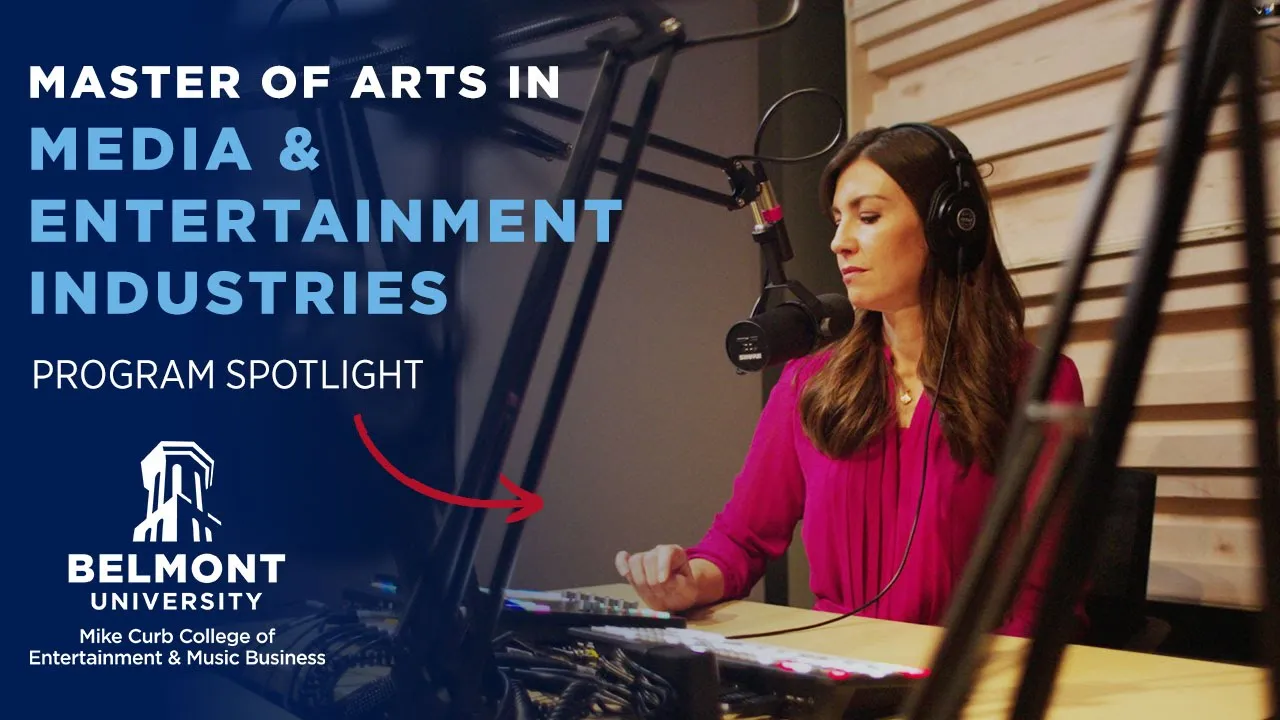Why Earn a Master's Degree in Media & Entertainment?
Advance your career in the media and entertainment industry by joining a dynamic 1-year hybrid program, designed for driven professionals like you. Benefit from flexible classes, accessible online and tailored to fit your life and schedule, while learning from Emmy and Grammy Award-winning faculty who bring cutting-edge industry insights and trends. Gain hands-on experience with state-of-the-art equipment as you delve into the history, theory and practice of media and entertainment to sharpen your critical understanding of its cultural impact. The program includes two residencies in Nashville (August 7-9, 2025 and May 13-16, 2026), connecting you with key industry players and offering the chance to participate in an optional internship in a vibrant entertainment capital. Stay ahead of the curve in an ever-evolving field with the tools and skills necessary to thrive and innovate.

Who is this program for?
The Master of Arts in Media & Entertainment Industries is designed for professionals eager to gain expertise and hone their skills in the global media and entertainment industries. Prospective students typically hold undergraduate degrees in fields such as media, communications, music, business, the creative arts, entertainment, or audio and recording arts. Graduates of this program are well-equipped to seek roles or advancement in creative production, content development, management, and promotion within the global media and entertainment industries. Additionally, they may choose to further their academic or professional pursuits through advanced degrees like Ph.D., J.D., Ed.D., or D.A. The program aims to equip students for both academic and professional success.
What You'll Learn
The Master of Arts in Media and Entertainment Industries is designed to prepare you for a successful career in the ever-evolving media landscape. This program blends theory with practical application, offering you the tools and experiences needed to excel in a range of media-related fields.
The program offers two specialized concentrations designed to further your career goals by equipping you with expertise to lead and innovate in this dynamic industry:
Content Creation Concentration
This specialization will teach you how to produce and launch top-tier content, transforming intricate concepts, information, and data into captivating narratives.
Music Business Concentration
Designed for those eager to immerse themselves in the music industry, this program equips you with the essential skills to thrive and achieve success in the dynamic world of music business.
Program Details
Program Overview
The M.A. in Media & Entertainment Industries is a 30-credit degree that includes courses in media & entertainment theory, industry practices and critical analysis. You will learn the latest trends and technologies in the industry, as well as the cultural and economic contexts that shape the media & entertainment economy.
In addition to core courses covering research and data analysis, digital branding and marketing, media law and ethics, this program covers the principles and practices of creativity and the creative process, leadership practices that nurture and guide creatives and the art and science of storytelling through visual communication and podcasting.
The curriculum includes a professional core (21 credits) with electives (9 credits) that provide a foundation in media & entertainment industry practices with an opportunity to specialize in an area of professional interest.
Courses You'll Take
- ETM 5200, Entertainment Theory (3): A historical, methodological, and theoretical study of media and popular culture. This course explores the complex relationship between media, society, and individual engagement through the metaphor of different "lenses," each representing a distinct media theory. Students will analyze how media shapes perception, influences behavior, and constructs narratives through various theoretical perspectives.
- ETM 5300, Innovation & Creative Confidence (3): is a course that explores the principles and practices of creativity and the creative process. The course will cover a variety of topics, including the psychology of creativity, the role of inspiration and motivation, methods for generating and evaluating ideas, and strategies for fostering a culture of innovation within organizations. Students will have the opportunity to participate in hands-on exercises and real-world projects to develop their own creative skills and build their creative confidence. Through a combination of lectures, discussions, and group work, students will learn to think outside the box and develop the tools they need to generate and implement innovative ideas in their personal and professional lives.
- ETM 5400, Media and Entertainment in the Digital Age (3): This course examines the ways in which digital technologies have transformed the media and entertainment industries. Topics may include the rise of streaming services, the impact of social media on the distribution of content, the emergence of new business models, and the role of data and analytics in the industry. The course may also explore the ways in which these changes have affected the creation, distribution, and consumption of media and entertainment products, as well as the implications for consumers, creators, and industry professionals. The course may include case studies, guest lectures, and hands-on projects to provide students with a comprehensive understanding of the digital media landscape.
- ETM 5700, Decision-Making & Analytics in Media & Entertainment (3): Students will demonstrate an advanced, theory-based understanding of how consumer research is conducted and used in the entertainment industry, using innovative methods and new research techniques. Emphasis will be placed on current secondary research tools.
- ETM 5800, Global Marketing of Media & Entertainment Industries (3): This course will advance students' knowledge of marketing strategies in the global entertainment, media, and sports sectors, including film, television, music, publishing, video games, the performing arts and other industries that supply goods associated with artistic, cultural, or entertainment value.
- ETM 6200, Leading Your Team of Creatives (3): This course looks at how an organization’s leadership nurtures and guides creatives while meeting the goals of the organization.
- ETM 6300, Media Law & Ethics (3): This course examines the legal and ethical issues that arise in the media industry. The course will cover a range of topics, including freedom of speech and press, intellectual property, privacy, and defamation. Students will learn about the laws and regulations that govern the media industry, as well as the ethical considerations that media professionals must take into account when creating and distributing content. The course will also explore case studies and current events to provide students with a deep understanding of the legal and ethical challenges that media professionals face. Through a combination of lectures, discussions, and hands-on exercises, students will develop their critical thinking skills and learn how to navigate the complex legal and ethical issues that arise in the media industry.
- ETM 6900, Internship (1-3). A student may gain practical experience in the media entertainment industries by working in a related business. Maximum of 3 credit hours may be applied toward program completion.
- ETM 6400, Digital Branding & Content Creation (3): This course explores the principles and practices of creating and managing a brand in the digital age. The course will cover the key concepts and strategies of digital branding, such as creating a strong brand identity, crafting a compelling brand story, and building a loyal audience. Students will learn how to create and distribute high-quality content that engages and resonates with their target audience, and how to use digital tools and platforms to amplify their message and reach a wider audience. The course will also explore case studies and best practices from leading companies and will provide students with hands-on experience in creating and managing a digital brand. Through this course, students will learn how to create a strong brand presence and build a loyal following in the digital space.
- ETM 6500, Visualization & Storytelling (3): This course examines the art and science of visual communication and storytelling. The course will cover a range of topics, including design principles, data visualization, infographics, and motion graphics. Students will learn how to use visual elements to convey complex ideas, information and data, and to tell compelling stories. The course will include hands-on exercises and projects to develop students' technical skills and creativity. Through a combination of lectures, discussions, and group work, students will learn to think critically about visual communication and storytelling and will develop the tools they need to create effective visual content for a variety of media platforms. The course will also explore the latest trends and tools in the field and will provide students with the opportunity to work on real-world projects and gain practical experience.
- ETM 6600, Podcasting (3): is a course that examines the art and science of storytelling and podcast production. The course will cover the key concepts and techniques of storytelling, including structure, characterization, and pacing, as well as the technical aspects of podcast production, such as audio recording, editing, and post-production. Students will learn how to use storytelling techniques to create compelling and engaging audio content and how to use podcast production software and hardware to bring their stories to life. The course will include hands-on exercises and projects, as well as workshops, where students will have the opportunity to create their own podcast episodes. Students will carve out their own space in a particular niche while also learning how to distribute and market their podcast to a specific target demographic. Ethics will be taught and kept in check throughout the semester and special attention will be given to ensure a diverse set of voices and ideas are incorporated into each podcast. Guest speakers from the podcasting industry will be invited to share their experience and insights. Through this course, students will learn how to create and produce high-quality audio content that can be distributed on various platforms.
You'll also take specific courses for your chosen emphasis to further develop your skills and interest such as:
- Digital Branding & Content Creation
- Podcasting
- Data Visualization & Storytelling
- Music Licensing & Contracts
- Strategic Marketing in the Music Business
When you graduate, you'll have the tools to thrive in any area of the creative economy.
Full admission to the M.A. program requires completion of a bachelor's degree from a regionally accredited college or university. Undergraduate students interested in admission to the program may apply for provisional admission to the program after completion of ninety-six undergraduate credit hours of 75% of their respective program. Full admission will be granted after transcripts confirming successful completion of the bachelor's program are received.
To apply for admission to the ETM program:
- Complete the online application.
- Submit an essay statement of professional aspirations.
- Submit two letters of recommendation from individuals who are qualified to evaluate the applicant's potential for successful masters-level graduate work.
- Submit a complete curriculum vitae and/or professional résumé.
- Submit official transcripts from all prior regionally accredited college-level academic work.
- GRE will be optional for the first two years.
- Be proficient in the English language*
- Pay the non-refundable graduate application fee.
*International applicants from countries in which the official language is not English are required to take either TOEFL or IELTS.
Benchmarks for Admission
The program will target applicants with GRE scores in the upper 50% of the currently published national means for Humanities/Arts and Social Science sectors.
Transcripts
All official transcripts must arrive securely in a sealed and stamped envelope or via secure online submission from the issuing institution. When requesting an electronic transcript, email to belmontadmissions@belmont.edu. Current students, please use your MyBelmont account to go to www.studentclearinghouse.org.
Application materials not submitted electronically should be mailed directly to: Office of Admissions, Belmont University, 1900 Belmont Blvd., Nashville, TN 37212.
Application Status
Applicants are accepted on a rolling admissions basis. To check on the status of your application, check your BU4U portal.
International Students
International applicants whose native language is not English must demonstrate proficiency in the English language by submitting official TOEFL scores or other university accepted proficiency exam. Learn more about International Admissions
To determine your total estimated costs per semester and learn more about the types of federal financial aid available, please visit our Graduate Admissions and Aid website.

Career Possibilities
Our students have gone on to work in various roles within the entertainment industry including, but not limited to:
- Music
- TV & Film
- Streaming
- Book Publishing
- Social Media Manager
- Entertainment Marketing Manager
- Entertainment Data Analyst
- Artist Management
- Content Creator
Request Information
Contact Us
Mike Curb College of Entertainment & Music Business
Emily Oldham
Enrollment Coach
615.460.8176
Email Emily


